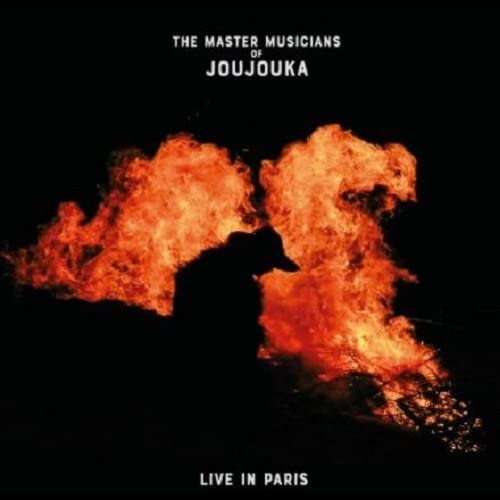MOST READ
- interview with xiexie オルタナティヴ・ロック・バンド、xiexie(シエシエ)が実現する夢物語
- Chip Wickham ──UKジャズ・シーンを支えるひとり、チップ・ウィッカムの日本独自企画盤が登場
- Natalie Beridze - Of Which One Knows | ナタリー・ベリツェ
- 『アンビエントへ、レアグルーヴからの回答』
- interview with Martin Terefe (London Brew) 『ビッチェズ・ブリュー』50周年を祝福するセッション | シャバカ・ハッチングス、ヌバイア・ガルシアら12名による白熱の再解釈
- VINYL GOES AROUND PRESSING ──国内4か所目となるアナログ・レコード・プレス工場が本格稼働、受注・生産を開始
- Loula Yorke - speak, thou vast and venerable head / Loula Yorke - Volta | ルーラ・ヨーク
- interview with Chip Wickham いかにも英国的なモダン・ジャズの労作 | サックス/フルート奏者チップ・ウィッカム、インタヴュー
- interview with salute ハウス・ミュージックはどんどん大きくなる | サルート、インタヴュー
- Kim Gordon and YoshimiO Duo ──キム・ゴードンとYoshimiOによるデュオ・ライヴが実現、山本精一も出演
- Actress - Statik | アクトレス
- Cornelius 30th Anniversary Set - @東京ガーデンシアター
- 小山田米呂
- R.I.P. Damo Suzuki 追悼:ダモ鈴木
- Black Decelerant - Reflections Vol 2: Black Decelerant | ブラック・ディセレラント
- Columns ♯7:雨降りだから(プリンスと)Pファンクでも勉強しよう
- Columns 6月のジャズ Jazz in June 2024
- Terry Riley ——テリー・ライリーの名作「In C」、誕生60年を迎え15年ぶりに演奏
- Mighty Ryeders ──レアグルーヴ史に名高いマイティ・ライダース、オリジナル7インチの発売を記念したTシャツが登場
- Adrian Sherwood presents Dub Sessions 2024 いつまでも見れると思うな、御大ホレス・アンディと偉大なるクリエイション・レベル、エイドリアン・シャーウッドが集結するダブの最強ナイト
Home > Reviews > Album Reviews > The Master Musicians of Joujouka- Live in Paris

The Master Musicians of Joujouka
Live in Paris
Unlistenable Records
ジェイムズ・ハッドフィールド(訳:江口理恵) May 31,2021 UP
過去5年の間、もしくは、これまでに観たなかで最高のライヴのひとつが、2017年の音楽フェスティヴァルFRUE(フルー)でクロージングを飾ったザ・マスター・ミュージシャンズ・オブ・ジャジューカだった。このモロッコ人たちは二度のアンプリファイド(音響ありの)・パフォーマンスで、メイン・ステージの観客の心を揺さぶる能力を披露し、すでにその週末のスターとなっていた。
そんな彼らの最終ステージは、会場を音楽祭のマーキー(大テント)に移しての深夜のアコースティック・セットだったが、PAなしで耳が聴こえなくなるぐらいの大音量を出すことのできるバンドには、そのような違いは、ほとんど意味を持たない。舞台のセッティングは、リフ山脈の麓にある彼らの村で毎年開催されているフェスティヴァルを再現したもので、舞台を覆うように敷かれた、すり切れたラグまでもが忠実に再現されていた。
そのイベントを二回ほど体験していた自分としては、何が起こるか、大方の予想はしていたものの、彼らの音楽がFRUEの数百人の観客にもたらした効果には、やはり驚かされた。その喜びに耽る夜は、本物の、ハンズ・イン・ジ・エア(両手を空にあげる)なレイヴのようで、4時間近くに及ぶパフォーマンスで、グループが新たな高みへと昇華する度に観客は喜びの雄叫びをあげた。
このような体験をレコードに収めるのは常に難儀なことであり、非常に優れたいくつかのリリースを含むマスターズのディスコグラフィでも、彼らのライヴ・パフォーマンスほどの恍惚感をもたらしたものはない。彼らの名を世に知らしめた1971年のアルバム『ブライアン・ジョーンズ・プレゼンツ・ザ・パイプス・オブ・パン・アット・ジャジューカ』では、サイケデリックな特性を際立たせるために、音楽に電子的な処理が施され、そのフィジカリティ(肉体的な衝動)が犠牲になってしまった。
それ以来、グループのリリース(バシール・アッタール率いるライヴァルの一団であるThe Master Musicians of Jajoukaも含む)は、フィールド録音から、2000年にアッタールがその一団とタルヴィン・シンとで制作した、グループの名を冠したアルバム(これはスルーしてよい作品。信じてほしい)のような作り込み過ぎたワールドビート・フュージョンのようなものなど、多岐にわたっている。しかし、2016年にパリのポンピドゥー・センターで行われた「ビート・ジェネレーション展」でのコンサートを収録した『ライヴ・イン・パリ』ほど、好き勝手に、力強くやっている録音はないと自信を持っていえる。
2017年の日本ツアーの際に限定盤として販売されたCDの、正式なLPレコードとデジタル音源のリリースは、1年以上にわたるCOVID-19煉獄の後では、より歓迎されるに違いない。これは、マスター・ミュージシャンズのアンプリファイド・モードであり、2017年のErgot Recordsからリリースされた『Into The Ahl Srif』のフィールド録音とは全く異なっており、私が記憶しているジャジューカのフェスティヴァルでのサウンドに近いものになっている。
とくにカーマンジャ(ヴァイオリン)奏者のアハメッド・タルハは、アンプの使用により、驚くべき微分音が際立つという恩恵を受け、より力強い演奏となっている。彼は1枚目のB-SIDEで中心的な役割を果たしており、故・アブデスラム・ブークザールがリード・ヴォーカルを務めた“ブライアン・ジョーンズ・ジャジューカ・ヴェリー・ストーンド”などの定番曲で、喜びにあふれんばかりの演奏を披露。裏面にも同じような曲がいくつか登場するが、ここでは音楽は曲がりくねったような、コール&レスポンスのリラ(笛)とパーカッションがヒプノティックにブレンドされており、複雑なポリリズムが各曲の終わりに突然跳ねて、アッチェレランドで加速していく。
しかし、最大の魅力は、アルバムの2枚目に収録された、トランス状態を誘発するような“ブゥジュルード”のフル・ヴァージョンだ。伝統的には、これはジャジューカ村のフェスティヴァルの最終夜に、火の灯された儀式のサウンドトラックとして演奏される組曲で、普段は寡黙なモハメド・エル・ハットミが、伝説の半人半獣(人間とヤギ)のブゥジュルードとして知られる生き物を体現する。
武骨な毛皮の衣装を身に纏い、悪霊を追い出すために人々を激しく叩くハットミの姿は、秋田県男鹿半島のナマハゲを思い出すが、音楽は全くの別物で、感覚を奪われるようなダブル・リード楽器のライタ(あるいはガイタ)が、雷鳴のようなパーカッションを背景に、群がり合い、渦を巻くように襲ってくる。
ライナー・ノーツのなかで、グループのマネージャー兼プロデューサーであるフランク・リンは、コンサートのこの部分は、音楽の原始的なオーセンティシティ(真正性)を保つために、ペアのステレオ・マイクロフォンを2つ使用したと洒落た言葉で説明しているが、これは、非常に激しくロックしているという意味だ。44分近くに及ぶ曲の中央部では、ライタが集結し、奇妙なフェイジングの効果を発揮して、音楽そのものが錯乱しているかのようだ。
グループのライヴを体験できる機会が不足しているなか、このもっとも純粋な形のトランス・ミュージックは、自分自身を解き放ち、身をゆだねるべき音である。唯一、このLPヴァージョンの批判をするとしたら、半分聴いたところで、こいつをひっくり返さなくてはならないことだ。リンによると、ポンピドゥー・センターでのコンサートでは、ステージへの客の侵入で最高潮に達したというが、これはスーサイドが演奏して以来の出来事だったそうだ。この証拠に基づけば、それこそが、道理にかなった反応だったと思う。
(アラビア語読み協力:赤塚りえ子)

The Master Musicians of Joujouka
Live in Paris
Unlistenable Records
bandcamp
James Hadfield
One of the best shows I’ve seen in the past five years―maybe ever―was the closing set that the Master Musicians of Joujouka played at Festival de Frue in 2017. The Moroccans were the stars of the weekend, having already done a pair of amplified performances that demonstrated their ability to rock a main-stage crowd.
For their final appearance, they shifted to a marquee in the festival campsite for a late-night acoustic set―though such distinctions mean little to a band that’s capable of achieving deafening volumes without the need for a PA. The setting was a convincing recreation of the festival that the group hold each year at their village in the foothills of the Rif Mountains, right down to the threadbare rugs covering the stage.
Having been to that event a couple of times myself, I had a fairly good idea of what to expect, but the effect the music had on the assembled crowd of a few hundred people at Frue still took me by surprise. It was a night of joyous abandon: proper hands-in-the-air rave stuff, people howling with joy as the group kept ascending to new heights of intensity over a performance lasting nearly four hours.
Capturing that kind of experience on record is always going to be a challenge, and the Masters’ discography―while featuring some very fine releases―has never delivered anything quite as ecstatic as their live performances. On the 1971 album that first introduced them to a wider audience, “Brian Jones Presents the Pipes of Pan at Joujouka,” the music was subjected to electronic treatments that accentuated its psychedelic properties at the expense of its physicality.
Since then, the group’s releases―and those by rival outfit The Master Musicians of Jajouka led by Bachir Attar―have ranged from field recordings to over-produced worldbeat fusion efforts like the self-titled 2000 album that Attar’s troupe recorded with Talvin Singh (trust me: you can skip it). But I’m confident in saying that nothing has kicked out the jams quite as emphatically as “Live in Paris,” which captures a 2016 concert at the Centre Georges Pompidou, held as part of an exhibition dedicated to the Beat Generation.
Sold in a limited CD edition during the group’s 2017 Japan tour, the album has finally had a proper vinyl and digital release, and after over a year of COVID-19 purgatory it feels all the more welcome. This is the Master Musicians in amplified mode, and it’s very different from the field recordings heard on the 2017 Ergot Records release “Into The Ahl Srif,” which came closer to how I remember them sounding at the festival in Joujouka.
Kamanja (violin) player Ahmed Talha in particular benefits from amplification, letting his astonishing microtonal playing assert itself more forcefully. He takes a central role on the B side of the first disc, which features ebullient renditions of staples like “Brian Jones Zahjouka Very Stoned,” with lead vocals by the late Abdeslam Boukhzar. Some of the same pieces pop up on the flip side, though here the music is a hypnotic blend of sinuous, call-and-response lira flutes and percussion, with complex polyrhythms that leap into sudden accelerandos at the end of each piece.
However, the biggest draw is the album’s second disc, which contains a full version of the trance-inducing “Boujeloud.” Traditionally performed on the final night of the festival in Joujouka, this suite provides the soundtrack for a fire-lit ritual, in which the normally retiring Mohamed El Hatmi embodies the mythical half-man, half-goat creature known as the Boujeloud.
The spectacle of Hatmi, dressed in a ragged fur costume and vigorously thwacking people to drive out evil spirits, brings to mind the Namahage of Akita’s Oga Peninsula, but the music is something else altogether: a sense-scrambling assault of double-reeded ghaita that seem to swarm and swirl around each other, backed by thunderous percussion.
In the liner notes, the group’s manager and producer, Frank Rynne, explains that this part of the concert was recorded with two stereo pair microphones to “maintain the primordial authenticity” of the music, which is a fancy way of saying that it rocks very hard indeed. During the central stretch of the nearly 44-minute piece, the massed ghaita start creating weird phasing effects, like the music itself is becoming delirious.
Short of catching the group live, this is trance music in its purest form―sounds to lose yourself in, surrender to―and my only criticism of the vinyl edition is that you have to turn the damn thing over halfway through. The Pompidou concert culminated with a stage invasion, which Rynne says had only previously happened when Suicide played there. On this evidence, it was the only sensible response.
ジェイムズ・ハッドフィールド
ALBUM REVIEWS
- Loula Yorke - speak, thou vast and venerable head/ Loula Yorke - Volta
- Actress - Statik
- Black Decelerant - Reflections Vol 2: Black Decelerant
- High Llamas - Hey Panda
- The Stalin - Fish Inn - 40th Anniversary Edition -
- KRM & KMRU - Disconnect
- Cornelius - Ethereal Essence
- Kronos Quartet & Friends Meet Sun Ra - Outer Spaceways Incorporated
- Martha Skye Murphy - Um
- Mouchoir Étanche - Le Jazz Homme
- Taylor Deupree - Sti.ll
- John Cale - POPtical Illusion
- Amen Dunes - Death Jokes
- A. G. Cook - Britpop
- James Hoff - Shadows Lifted from Invisible Hands


 DOMMUNE
DOMMUNE
